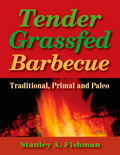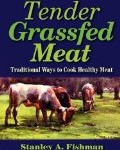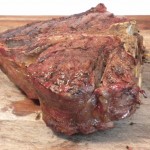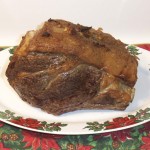The First Low-Carb Doctor—2500 Years Ago!
By Stanley A. Fishman, author of Tender Grassfed Meat

 photo credit: bazylek100
photo credit: bazylek100
Dr. Robert Atkins is credited (or blamed) for creating the low-carb diet. But Dr. Atkins was not the first to advocate a high-fat, high-protein, low-carb diet for losing weight.
The father of medicine was also the father of low-carb. Hippocrates of Kos, the most famous and honored doctor of all time, known as the “Father of Medicine†was the first to advocate a low-carb diet for losing weight.
Who Was Hippocrates?
Hippocrates was born in the middle of the fifth century before Christ. He revolutionized the practice of medicine in ancient Greece. At that time, there was a conflict in Greek medicine. There was a division between those doctors who relied on aggressive, dangerous treatments like drugs and surgery (yes, the ancient Greeks used both), and those who saw illness as a punishment from the gods and advocated religious means for healing. Hippocrates created a new path for healing.
Hippocrates studied his patients by observing them, taking careful notes, and using his experience to diagnose their conditions. His approach was centered on strengthening the patient through food, exercise, and rest, so the patient’s body could heal itself. Some other techniques used to strengthen the body included massage, inhaling various fragrances, soft music, relaxation, even gentle conversation designed to help calm the patient, and other similar techniques.
Hippocrates taught that it was more important to know the patient’s body and how to strengthen it, than to know the disease the patient had. Hippocrates taught that the body had the power to heal any illness, if the natural processes were properly supported.
The Hippocratic way of healing always started with diet and exercise. Only if those did not work was medication used. The use of medication was stopped when the patient was well enough to respond to diet and exercise. Surgery was the last resort. The doctor was instructed that every patient was a unique individual, and treatment had to be designed for each particular patient. This was the total opposite of today’s “same treatment for the same disease for everybody†approach.
Hippocrates taught that the patient should be treated with kindness, respect, love, and understanding, and knew that a person’s mental attitude had a great deal to do with the healing process.
Hippocrates believed that aggressive medical treatment could do great harm to the patient, and said that the most important rule for the physician was, “First, do no harm.â€
Why Was Hippocrates Considered the Greatest Doctor of All Time?
Hippocrates was considered the greatest doctor of all time, because he was so successful in treating illness. While he did not cure everybody, he cured so many that he became recognized as the greatest and most successful doctor of antiquity, perhaps of all time.
Hippocrates became particularly famous when he was credited with stopping the great plague that hit Athens during the Peloponnesian War. Athens was under siege, with large numbers of people and animals crowded together. All food had to be brought in by sea, and there was a shortage of fresh food. A terrible plague broke out, killing thousands. The drugs and treatments of the conventional doctors proved useless, as did trying to appease the Greek gods. Hippocrates and his followers came to Athens to try to cure the plague, as it was feared that this terrible disease would wipe out Athens and threaten the very survival of the rest of Greece.
Diet and exercise would not work here, as the victims of the plague were too sick to keep food down, or to exercise. Hippocrates carefully observed the situation. He noticed that the only group of people not affected by the plague were the blacksmiths and their workers. Hippocrates noted that the blacksmiths spent a great deal of time around burning fires, and often drank warm water that had been brought to a boil, since they were always around hot fires. Hippocrates gave these instructions to the people of Athens:
- They were to light large fires in every home, and keep them burning.
- All corpses were to be burned completely.
- All water was to be boiled before drinking.
The people of Athens followed his prescription, and the plague soon ended.
I should mention that modern doctors and historians call this a legend, refusing to believe that an ancient physician could cure the plague. After all, he had no modern drugs or antibiotics. Any end to the plague must have been a coincidence that had nothing to do with Hippocrates. But the people who were actually there gave credit to Hippocrates, and considered him the greatest doctor in the world.
How to Lose Weight—“Let the Foods Be Richâ€
Hippocrates lived in a time when many people were fat, and wanted to lose weight. He said: “People who wish to become thin should let the foods be rich.â€
Hippocrates believed that a diet consisting of rich foods would satisfy the appetite, giving the body what it needed so the patient would not eat too much. “Rich food†in his day meant the fat from grassfed animals and pigs, fatty cheeses, and fatty meats. By limiting his patients to the rich foods, he was putting them on a low-carb diet, a diet that was very similar to the one advocated by Dr. Atkins, 2500 years later!
Hippocrates also cautioned doctors to avoid a “one size fits all†approach to weight loss. He stated that each patient had a natural weight that was ideal for that person. The goal was to reach the degree of thinness that the patient’s body would support, and maintain naturally with a good diet.
By advocating that each patient reach the level of thinness that was right for them, Hippocrates rejected the idea that every person must reach the same degree of thinness. The modern idea of identical thinness for everyone has caused so much pain and misery, causing the horrible cycle of drastic weight loss followed by drastic weight gain that is so common today. This horrible cycle is repeated by person after person, resulting in huge profits for the diet industry.
It should be noted that Hippocrates prescribed various diets to help sick people. Sometimes he would prescribe a diet that contained carbs, and sometimes he would put a patient on an all-barley diet for a short period, but not for weight loss. As always, he customized his treatment to the individual patient.
Hippocrates Said
Some of the quotes from Hippocrates really show his philosophy, and are completely consistent with the alternative doctors of today:
“Let food be thy medicine, thy medicine shall be thy food.â€
“Leave your drugs in the chemist’s pot, if you can cure the patient with food.â€
“Walking is man’s best medicine.â€
The Hippocratic Oath
Hippocrates is famous for establishing a code of ethics for the medical profession, which was embodied in an oath he wrote for all physicians to take.
There was a time when all Western doctors took the oath, though many did not honor it. The modern version of the Hippocratic Oath does not even resemble the oath written by Hippocrates, and is completely different.
To me, the most important part of the original Hippocratic Oath is stated in this paragraph:
“I will use those dietary regimens which will benefit my patients according to my greatest ability, and judgment, and I will do no harm or injustice to them.â€
In other words, doctors used to take an oath to heal with diet! Not drugs, radiation, or surgery, but diet.
Hippocrates and the Research of Dr. Weston A. Price
The healing approach of Hippocrates, based on a healthy diet that supports the natural functioning of the body, is completely consistent with the findings of Dr. Weston A. Price.
Dr. Weston A. Price studied a number of healthy peoples who ate the diet of their ancestors. All of these peoples followed the Hippocratic method of using diet to support the natural functions of their bodies. All of these peoples were completely free of the chronic diseases that plague the modern world. All of these peoples ate a diet that was much higher in animal and fish fat, and much lower in carbs than modern diets. And all of these peoples were in great physical shape, with obesity being unknown.
Dr. Robert Atkins, the founder of the modern low-carb diet, had been demonized, vilified, and heavily criticized. His critics constantly claimed that his findings had no support in science or history. They were wrong, as the greatest physician of all time, Hippocrates of Kos, also prescribed a low-carb diet for losing weight, using very much the same approach as Dr. Atkins.
Related Posts
How Grassfed Meat Helps Weight Loss
This post is part of Real Food Wednesday, Fight Back Friday and Monday Mania blog carnivals.
Butter Helps Weight Loss
By Stanley A. Fishman, author of Tender Grassfed Meat
Pastured butter is one of the finest foods you can eat. It is perhaps the single most nutritious food available to us. The nutritional benefits of pastured butter are too extensive to summarize here. Here is a link to an excellent article describing the many benefits of butter: Why Butter Is Better. Yet butter has been under attack for decades. Many people are afraid to eat it. People think butter will make them sick and fat. The truth is that butter is very nutritious and helps in weight loss by providing necessary nutrients and satisfying the appetite. Yet a famous cardiologist came out recently and said that butter causes weight gain, citing a Spanish study.
Here is a “study†that I find convincing. Low-carb advocate Jimmy Moore has been eating eight tablespoons of pastured butter a day for the last several weeks. Jimmy Moore lost over 24 pounds in 3 weeks while eating 8 tablespoons of butter every day. Does that sound like weight gain? Butter helps weight loss.
But what about that Spanish study? Jimmy Moore interviewed a number of qualified experts about this Spanish study. They were not convinced, and pointed out many problems with the study and the way it was interpreted. Here is a link to Jimmy’s blog on the subject, which includes the experts’ response:
Does Butter Raise Insulin and Make You Fat? The Low-Carb Experts Respond to this Claim
Here is a link to my podcast interview with Jimmy Moore:
Stanley Fishman Cooks Grassfed Meats the RIGHT Way!
This post is part of Fight Back Friday at Food Renegade.
Energizing Egg Recipe: A Nutritional Powerhouse
By Stanley A. Fishman, author of Tender Grassfed Meat
This just might be the most nutrient-dense egg dish I know.
This recipe was inspired by low-carb advocate Jimmy Moore. Jimmy is on a very unusual diet. He is eating only eggs, butter, and cheese. For each egg he eats, he has 1 tablespoon of butter and can have up to 1 ounce full fat cheese. Jimmy is using pastured eggs from a local farmer, pastured butter, and raw cheese. The amount of nutrients in each of these ingredients is huge, and combining them enhances their value even more. This diet has ignited a storm of controversy on the Internet, but Jimmy is fine with it. He has lost over 20 pounds in two weeks, and has been able to give up artificially sweetened diet soda for the first time in six years. He is full of energy and feels great. Jimmy calls this diet “eggfest.â€
I should mention that this diet was specifically designed for Jimmy by health care professionals, and he is being carefully monitored while on it. Obviously, this is a short term diet, not a permanent one.
I am not recommending or condemning this diet. I am doing fine with the Weston A. Price Foundation diet, and I am not about to give up my grassfed meat and fat.
But I do recommend this egg dish, which combines all the elements of Jimmy’s eggfest to create a nutritional powerhouse. This is a wonderful dish for breakfast, and I find it really energizes me. And it tastes very good indeed. The stirring is very important as it really combines all the ingredients well. It may look like ordinary scrambled eggs, but wait until you taste it!
Here is a link to my podcast interview with Jimmy Moore:
Stanley Fishman Cooks Grassfed Meats the RIGHT Way!
Ultimate Energizing Eggs (The Jimmy Moore)
4 pastured eggs
4 ounces raw cheddar cheese, full fat
4 tablespoons pastured butter
- Chop the cheese into very small pieces.
- Break the eggs into a bowl and mix well with a fork.
- Add the cheese to the eggs and mix well.
- Heat the butter in a medium sized skillet over medium heat until the butter melts.
- Add the egg/cheese mixture to the butter and start stirring the mixture in a clockwise direction with a fork as it cooks.
- Continue to cook and stir until the eggs set. They should set within a few minutes and look just like the photo of the recipe.
Serve and ENJOY!
This post is part of Real Food Wednesday Blog Carnival for March 31, 2010 at Kelly the Kitchen Kop.
How Grassfed Meat Helps Weight Loss
By Stanley A. Fishman, author of Tender Grassfed Meat
Very few people think of grassfed meat and fat as a diet food. But eating grassfed meat and fat can satisfy your appetite so you eat less, stop your body from storing fat, and get your body to start burning fat. Grassfed meat and fat also give you many vital nutrients that you might not otherwise get while dieting. Most of the nutrients are in the fat. To paraphrase the title of one of my favorite books, you eat fat to lose fat. But it must be the right kind of fat—grassfed.
Where is the Fat?
The fat in meat is in two places, the exterior fat, which can be seen as a distinct slab on the top or side of the meat, and the interior fat, which is actually in the meat itself, often visible as small white specks (sometimes referred to as marbling).
Grassfed Meat is Different than Other Meat
The actual composition of grassfed meat is very different from that of conventional meat. Conventional meat has been fed large amounts of grain and other substances which are not the natural food of grassfed animals. This creates many changes in the meat, only some of which are known. For example, conventional beef fat has a much lower ratio of omega-3 fatty acids to inflammatory omega-6 fatty acids than grassfed beef fat. The ratio of omega-3 to omega-6 in conventional beef fat is often 1-20. The ratio of omega-3 to omega-6 in grassfed beef fat ranges from 1-1 to 1-4. Conventional meat did not exist prior to the 20th century. Grassfed meat has been nourishing humanity for uncounted thousands of years.
The Benefits of CLA
CLA, or Conjugated Linoleic Acid, has many benefits for someone who is trying to lose weight, as well as everyone else. CLA is abundant in the fat and meat of grassfed animals, and is easily absorbed in this form, making it available for your body to use.
- CLA normalizes thyroid function, so your thyroid produces substances which help normalize your weight, while avoiding the weight gain which often results from hyperthyroidism.
- CLA increases your metabolic rate, so your body burns more calories.
- CLA actually signals your body to stop storing fat, and to start burning it.
- CLA increases muscle mass while decreasing fat.
- CLA decreases abdominal fat.
Grassfed Meat and Fat Satisfy Your Hunger by Nourishing Your Body
One of the hardest things for anybody on a diet is to eat less, or to give up foods that you are used to eating. The constant hunger can make it very difficult to lose weight. The main reason for most hunger is very simple. The body is not getting the nutrients it needs, so it wants to keep eating until it has what it needs. The problem is that modern foods do not contain all the nutrients your body needs, so eating them does not satisfy hunger.
Grassfed meat and fat are nutrient-dense, containing many of the nutrients we know about, such as vitamins D and A, most B vitamins, vitamin E, many minerals, most amino acids, the proper ratio of omega-3 to omega-6 fats, and high quality protein. Grassfed meat and fat also contain nutrients which have not yet been discovered, but which your body still needs. Your body is ready, willing and able to absorb the nutrients in grassfed meat, as your ancestors have been eating this meat for thousands of years and longer.
Grassfed meat is much denser and less watery, and it satisfies. When you eat a properly cooked serving of grassfed meat and fat, your body is nourished, you are satisfied, and the hunger disappears. I eat about half as much meat since I switched to grassfed, and I am satisfied. When my hunger is satisfied, I lose all desire to eat.
Grassfed meat and fat can really help any dieter, especially the low carb dieter, as grassfed meat and fat are allowed on such diets.
A very good book on weight loss is Eat Fat, Lose Fat: The Healthy Alternative to Trans Fats by Sally Fallon and Mary Enig, PhD. Two great books that really support the low-carb dieter are: LIVIN’ LA VIDA LOW-CARB: My Journey From Flabby Fat to Sensationally Skinny in One Year and 21 Life Lessons From Livin’ La Vida Low-Carb: How The Healthy Low-Carb Lifestyle Changed Everything I Thought I Knew by Jimmy Moore.


 Photos of recipes from the new book Tender Grassfed Barbecue
Photos of recipes from the new book Tender Grassfed Barbecue
 Photos of recipes from the cookbook Tender Grassfed Meat
Photos of recipes from the cookbook Tender Grassfed Meat


